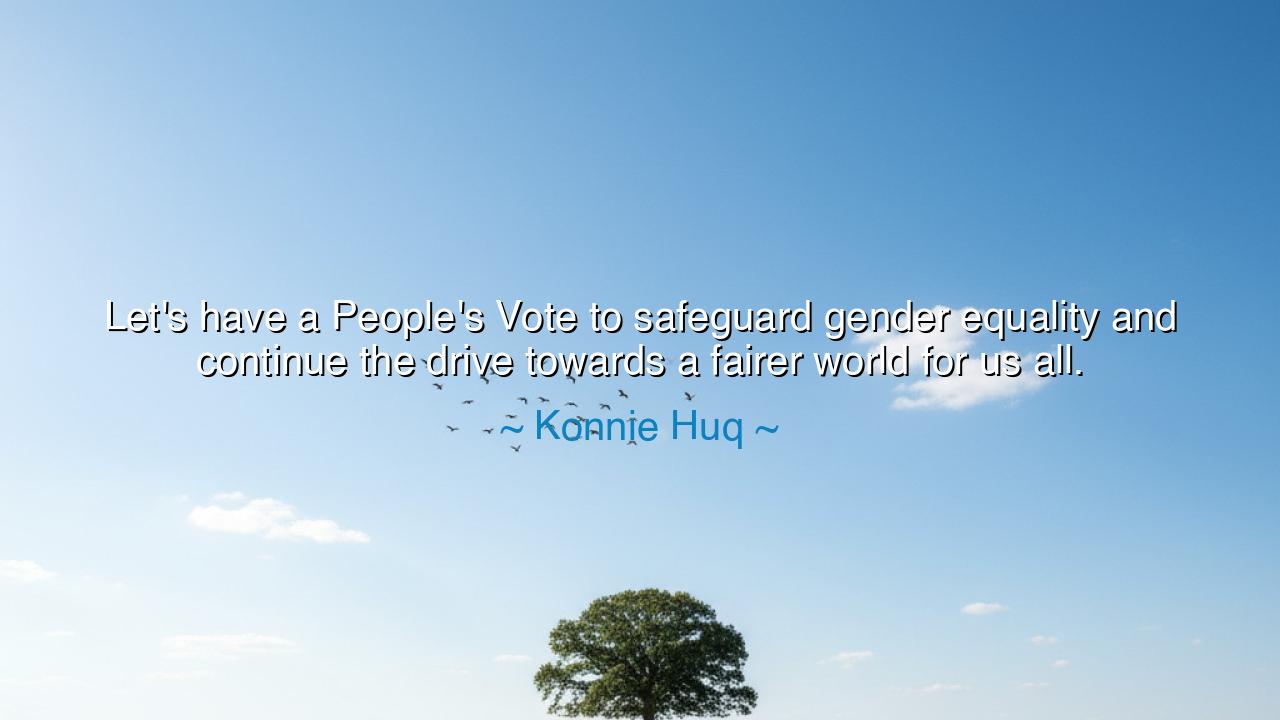
Let's have a People's Vote to safeguard gender equality and
Let's have a People's Vote to safeguard gender equality and continue the drive towards a fairer world for us all.






Listen closely, O Children of the Future, for the words of Konnie Huq are a powerful call to action: "Let's have a People's Vote to safeguard gender equality and continue the drive towards a fairer world for us all." These words ring with the urgency of justice and the deep conviction that change is not something that can be left to fate or to a few, but must be the collective responsibility of all. Huq’s call is a plea for the people to rise up, to take action, and to ensure that the fight for gender equality remains not just an ideal but a living reality. It is a call to participate, to make one's voice heard in the halls of decision, and to demand a world where fairness is not optional but a fundamental right for all.
In the ancient world, the concept of justice was often seen as the preserve of kings and philosophers. Yet even in these hierarchical societies, there were movements and voices that challenged the status quo. In Athens, where the birth of democracy is often hailed, the people’s voice was considered central to the shaping of the polis. The Athenian assembly was a place where free men could gather to discuss and vote on matters of governance. However, it is important to note that this democracy was not truly inclusive—it excluded women, slaves, and foreigners from participation. Yet even within this limited scope, the idea that the people should have a say in their destiny was powerful and enduring. Konnie Huq’s words revive this ancient ideal, reminding us that equality is not something granted by the few, but something that must be demanded by the many, in the name of justice for all.
Let us consider the Roman Republic, where the voice of the people was central, yet it was often suppressed by the elite Senate and powerful military leaders. The Gracchi brothers, Tiberius and Gaius, fought for land reforms to benefit the poor and disenfranchised, but their efforts were met with great resistance from the powerful families who controlled Rome’s wealth. The Gracchi were murdered, but their legacy lived on, for their struggle showed that the fight for fairness often requires sacrifice and unwavering conviction. They understood that equality—whether for the common people or for women—was not simply a matter of legal structures, but of moral action by those who have the courage to speak out and push for change. Konnie Huq’s call for a People’s Vote is in the same spirit—a reminder that equality cannot be passive. It requires the active participation of every person, pushing for a world that is fairer for all.
When we think of gender equality, let us turn our gaze to the women’s suffrage movement, which fought tirelessly for women to have the right to vote. Susan B. Anthony, Emmeline Pankhurst, and countless others faced fierce opposition, but their belief in the power of the people to enact change drove them to speak out and to act, even when the law and society seemed stacked against them. They understood that equality was not a gift to be given, but a right to be claimed. Just as the suffragettes fought to make their voices heard, Huq’s plea for a People’s Vote on gender equality invites us to continue the work they began—demanding the recognition of gender equality as a fundamental principle of society, not as something to be debated or negotiated, but as something to be enshrined.
In our modern world, the fight for gender equality continues, and Konnie Huq’s words remind us that the battle is not over. The world still holds deep divisions, where women remain underrepresented in leadership roles, where pay gaps persist, and where violence and discrimination continue to plague the lives of many. Yet, the People's Vote she speaks of is not merely a legal tool—it is a symbol of the democratic ideal that the power to shape society belongs to the people, all the people, regardless of gender. To vote, to speak, to act—this is the essence of freedom and justice. It is through collective action that we can push for a society that is more inclusive, more just, and more equal for all people, regardless of gender.
The lesson, O Children, is clear and urgent: Equality must be actively pursued. It is not enough to wish for a fairer world; we must demand it. Konnie Huq’s call to safeguard gender equality is not just a political statement; it is a moral summons for all of us to take part in the shaping of our world. The fight for equality must never be left to a few—it is the duty of the many to stand together, to vote, to speak out, and to ensure that the rights of all are upheld.
In your own life, remember this: You have the power to effect change. Do not wait for someone else to act on your behalf—take the lead, raise your voice, and push for fairness in every corner of your world. Whether it is in the workplace, in the home, or in the streets of your community, let your actions reflect your commitment to a world where equality is the norm. Let Konnie Huq’s words serve as a reminder that justice is never something that comes without effort—it is something we must work toward together, through the power of the people, and the conviction that every voice deserves to be heard. May you walk this path of action, integrity, and duty, knowing that the future of gender equality depends on the choices we make today.






AAdministratorAdministrator
Welcome, honored guests. Please leave a comment, we will respond soon